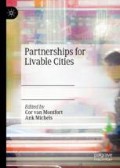Abstract
In order to address urban challenges Urban Living Labs (ULL’s) are set up as new forms of partnership between state, (market) and civil society. The primary governance challenge of ULL’s is to effectively use their liminal in-between position to create livable cities. However, liminal space at the same time is claimed to generate certain risks in terms of legitimate decision-making and accountability. By zooming in on the empirical case of ULL’s in a large Dutch city in the Randstad area the authors ask: Which key value trade-offs are made in the liminal space of ULL’s and which new institutional rules emerge in order to deal with these trade-offs?
In this chapter the authors identify the following trade-offs: institutional collaboration versus autonomous activism, professional versus lay participation and values, the social versus the material, place bound experimentation versus placeless learning and accountability and capital value versus societal value. Calls for new institutional rules for city making to deal with these trade-offs can potentially address the lack of legitimacy in decision-making, yet may also hamper the open-ended nature of experimentation by introducing bureaucratic procedures and co-opting labs into implementing formal policy.
Access this chapter
Tax calculation will be finalised at checkout
Purchases are for personal use only
Notes
- 1.
We would like to thank Wouter Berkhof, former intern at the municipality, who conducted part of the interviews together with Sabrina Rahmawan-Huizenga.
References
Augé, M. (1995). Non-places: Introduction to an anthropology of supermodernity. London: Verso.
Boonstra, B. (2018). De volgende stap voor het Rotterdamse stadsmaken. English title: The next step for Rotterdam city making. Commissioned essay by the Architecture Institute of Rotterdam.
Boonstra, B., De Vrieze, R., & Bongers, H. (2018). Beknopte analyse stadslabs legacy. Rotterdam: SMC 18.
Bovens, M. (2005). De verspreiding van de democratie. Beleid en Maatschappij, 32(3), 119–127.
Bulkeley, H., et al. (2016). Urban living labs: Governing urban sustainability transitions. Current Opinion in Environmental Sustainability, 22, 13–17.
Czarniawska, B., & Mazza, C. (2003). Consulting as a liminal space. Human Relations, 56(3), 267–290.
Ellis, N., & Ybema, S. (2010). Marketing identities: Shifting circles of identification in inter-organizational relationships. Organization Studies, 31(3), 279–305.
Gieryn, T. F. (2000). A space for place in sociology. Annual Review of Sociology, 26(2000), 463–496.
Gieryn, T. F. (2006). City as truth-spot: laboratories and field-sites in urban studies. Social Studies of Science, 36(1), 5–38.
Gopakumar, G. (2014). Experiments and counter-experiments in the urban laboratory of water-supply partnerships in India. International Journal of Urban and Regional Research, 38(2), 393–412.
Hajer, M. (2003). Policy without polity? Policy analysis and the institutional void. Policy Sciences, 36(2), 175–195.
Iedema, R., Long, D., & Carroll, K. (2012). Corridor communication, spatial design and patient safety: Enacting and managing complexities. In A. van Marrewijk & D. Yanow (Eds.), Organizational spaces: Rematerializing the workaday world (pp. 41–57). Cheltenham: Edward Elgar.
Ivanova, D., Wallenburg, I., & Bal, R. (2019). Place-by-proxy: Care infrastructures in a foundling room. Sociological Review, 68, 144. https://doi.org/10.1177/0038026119868642.
Karvonen, A., & Van Heur, B. (2014). Urban laboratories: Experiments in reworking cities. International Journal of Urban and Regional Research, 38(2), 379–392.
Lefebvre, H. (1991). The production of space. Oxford: Blackwell Publishing.
Leong, C. (2017). Hajer’s institutional void and legitimacy without polity. Policy Sciences, 50(4), 573–583.
Rahmawan-Huizenga, S., & Ivanova, D. (submitted). The Urban Lab as interpretative grid: Unraveling dominant urban imaginaries, Science as Culture.
Short, H. (2015). Liminality, space and the importance of ‘transitory dwelling places’ at work. Human Relations, 68(4), 633–658.
Stimuleringsfonds Creatieve Industrie. (2018). Manifest stadslabs. Pionieren aan de grote maatschappelijke opgaven. English title: Manifest Urban Labs. Pioneering big societal challenges.
Turner, V. (1974). Dramas, fields and metaphors. Ithaca: Cornell University Press.
Turner, V. (1982). From ritual to theatre: The human seriousness of play. New York: Performing Arts Journal Publications.
Van Gennep, A. (1960 [1909]). The rites of passage. Chicago: University of Chicago Press.
Voytenko, Y., McCormick, K., Evans, J., & Schliwa, G. (2016). Urban living labs for sustainability and low carbon cities in Europe: Towards a research agenda. Journal of Cleaner Production, 123, 45–54.
Westerhout, A., & Bongers, H. (2017). Stadsmaken in stadslabs. Een nieuwe aanpak van stedelijke ontwikkeling. English title: City making in urban labs. A new approach for urban development. https://www.puntkomma.org/voytenkogopakumarartikelen/stadmaken-in-stadslabs. Assessed 28 Mar 2019.
Author information
Authors and Affiliations
Corresponding author
Editor information
Editors and Affiliations
Rights and permissions
Copyright information
© 2020 The Author(s)
About this chapter
Cite this chapter
Oldenhof, L., Rahmawan-Huizenga, S., van de Bovenkamp, H., Bal, R. (2020). The Governance Challenge of Urban Living Laboratories: Using Liminal ‘In-Between’ Space to Create Livable Cities. In: van Montfort, C., Michels, A. (eds) Partnerships for Livable Cities. Palgrave Macmillan, Cham. https://doi.org/10.1007/978-3-030-40060-6_15
Download citation
DOI: https://doi.org/10.1007/978-3-030-40060-6_15
Published:
Publisher Name: Palgrave Macmillan, Cham
Print ISBN: 978-3-030-40059-0
Online ISBN: 978-3-030-40060-6
eBook Packages: Political Science and International StudiesPolitical Science and International Studies (R0)

